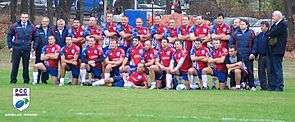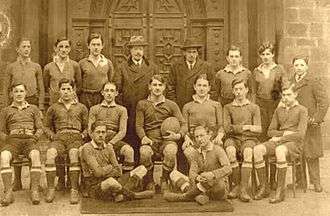Rugby union in Serbia
Rugby union in Serbia is a minor but growing sport. The game was first played in Belgrade after the first World War and was revived again in the 1950s. Serbia currently has 12 rugby clubs and around 2,000 players.[1]
| Rugby union in Serbia | |
|---|---|
 The Serbian national team in 2010. | |
| Governing body | Rugby Union of Serbia |
| Registered players | 2,419 |
| Clubs | 12 |
Club competitions | |
International competitions | |
| |
Governing body
The Rugby Union of Serbia (Рагби Савез Србије) is the national governing body for the sport.[2] It has been a member of World Rugby (formerly the IRB) since 1988.[3]
History
Early years: 1918 to 1931

The first known Serbian rugby players were students at George Heriot's School in Edinburgh, Scotland during the First World War. On March 8, 1918, they played the first unofficial international game against students from a British Colonies and won by eight points to three in front of 10,000 spectators. Notable players were Toma Tomic from Leskovac, Dimitrije Dulkanovic from Cuprija and Danilo Pavlovic from Prokuplje.[4] Under the name Serbians they played games against Edinburgh school teams - Royal High School, George Heriot's School, etc.
Another group of Serbian boys played rugby in Glasgow, in Hillhead High School. The best player was Slavoljub DJordjevic. From 1917 till 1926 he played more than 100 games for Hillhead High School, Hilhead High School FP and Glasgow University. In Dundee three Serbian boys - Miodrag Dimitrijevic, Dusan Bozjakovic and Vladimir Orovic, played for the High School of Dundee. In total more than 30 Serbian boys played rugby football in UK during WW1.
The students returned to Serbia after the war and formed the "Jugoslavija" club in Belgrade and the "Beli orao" club in Sabac. By 1923, however, rugby activities had ceased due to a lack of available pitches. In 1931 group of former students from Scotland - Toma Tomić, former George Heriot's School student, Krsta Balic, ex Hillhead High School and Milorad Jevdjovic, former Harris Academy, Dundee, formed Belgrade Rugby Club.
Rugby in Yugoslavia: 1953 to 1992
Rugby was re-introduced to the country in the 1950s. A Belgrade team, RK Partizan, was formed in 1953 and a few months later the Radnicki club was formed. The first match between the two teams was played in April 1954 with Partizan winning 21–11.
The Rugby Championship of Yugoslavia ran from 1957 to 1992. Dinamo Pančevo won the first championship played in 1957, and later in '68, '69, '74 and '79. Dinamo Pančevo won the first Cup competition held that same year, in 1979. RK Partizan, won the second, third, and fourth titles in 1958 to '60 as well as the final two in '91 and '92 before the breakup of Yugoslavia.
The Yugoslavia national rugby union team played its first international in July 1968 against a Romanian XV, losing 3 points to 11. Through the 70s and 80s, Serbian players represented Yugoslavia together with players from Slovenia, Croatia and Bosnia. This came to an end in 1991 with the Yugoslav Wars which resulted in a gap of five years with no international rugby.
Post-breakup: 1992 onward
The Serbian clubs played in the Serbia and Montenegro Championship from the 1992–93 season through until 2005–06. The competition became the Rugby Championship of Serbia from 2006–07 onwards.
When the Yugoslav team reformed in 1996, it consisted of players from Serbia only and they played their first international against Andorra at Vršac in May of that year. From 2003 to mid 2006, they played as Serbia and Montenegro. After the two countries split in 2006, Serbia and Montenegro had their own national teams.
Serbian national teams
The first official international match played by the Serbia national rugby union team was in October 2006. The Serbia women's national rugby union team played their first international in 2007, but now mainly focus on rugby sevens. The men's and women's national teams (15s and 7s) compete mainly in European competitions.
As of February 2015, the Serbian national team was placed 84th in the World Rugby rankings.[5]
Domestic structure
The teams in the Rugby Championship of Serbia as of 2019 are:
Division A: Division B: - Vojvodina
- Loznica
- Dinamo 1954
- Vršac
Development clubs: - Krusevac
- Zmajevi
- Pobednik
- Petrovgrad
- Borac Starcevo
Teams that previously participated in the Serbian Championship include:[b] RK Dinamo Pancevo, RK Dorćol, RK Iron Fortress (from Smederevo), Royal Belgrade and in Division B: RK Red Star and Balkan Mosquito.[6] Other rugby clubs in Serbia include the junior team Singidunum RK, and the Belgrade Women's rugby club (Ženski ragbi klub Beograd).[7] BRK Red Star also runs a sports program for people with disabilities.[7][8]
- a RK Pobednik was renamed RK Rad (Labor RC) in December 2014.[9] The club fields teams in both divisions of the national championship.
- b This list might be incomplete.
See also
References
- "Serbia". IRB. 2009. Archived from the original on 4 April 2009. Retrieved 30 December 2014.
- Ragbi Savez Srbije. Rugby Europe 2015.
- "Handbook" (PDF). World Rugby. 2014. pp. 16–10. Retrieved 28 January 2015.
- McGinty, Stephen (9 November 2014). "How Scots passed Serbs wartime gift of rugby". The Scotsman. Archived from the original on 18 February 2015.
- World Rugby Rankings, retrieved on 2 February 2015.
- "Serbian Championship" (in Serbian). Rugby Pobednik. 2013. Archived from the original on 17 May 2016.
- Clubs (in Serbian). Rugby Union Belgrade.
- OSMEH BRK Red Star.
- Pobednika becomes Rad (in Serbian) Supersport. 9 December 2014.